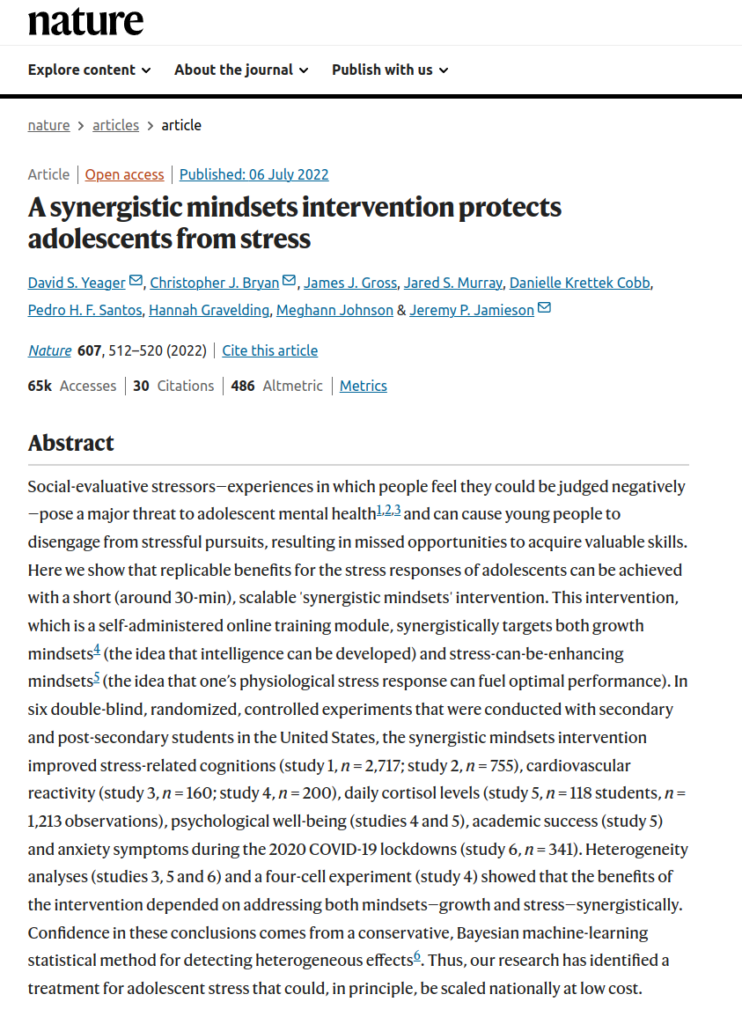Social-evaluative stressors—experiences in which people feel they could be judged negatively—pose a major threat to adolescent mental health1,2,3 and can cause young people to disengage from stressful pursuits, resulting in missed opportunities to acquire valuable skills. Here we show that replicable benefits for the stress responses of adolescents can be achieved with a short (around 30-min), scalable ‘synergistic mindsets’ intervention. This intervention, which is a self-administered online training module, synergistically targets both growth mindsets4 (the idea that intelligence can be developed) and stress-can-be-enhancing mindsets5 (the idea that one’s physiological stress response can fuel optimal performance). In six double-blind, randomized, controlled experiments that were conducted with secondary and post-secondary students in the United States, the synergistic mindsets intervention improved stress-related cognitions (study 1, n = 2,717; study 2, n = 755), cardiovascular reactivity (study 3, n = 160; study 4, n = 200), daily cortisol levels (study 5, n = 118 students, n = 1,213 observations), psychological well-being (studies 4 and 5), academic success (study 5) and anxiety symptoms during the 2020 COVID-19 lockdowns (study 6, n = 341). Heterogeneity analyses (studies 3, 5 and 6) and a four-cell experiment (study 4) showed that the benefits of the intervention depended on addressing both mindsets—growth and stress—synergistically. Confidence in these conclusions comes from a conservative, Bayesian machine-learning statistical method for detecting heterogeneous effects6. Thus, our research has identified a treatment for adolescent stress that could, in principle, be scaled nationally at low cost.
A synergistic mindsets intervention protects adolescents from stress
Abstract
Web and Email Links
Related Listings
Journal
Frontiers in Psychiatry
Background: Obsessive-compulsive disorder (OCD) is often a life-long disorder with high psychosocial impairment. Serotonin reuptake inhibitors (SRIs) are the only FDA approved drugs, and approximately 50% of patients are non-responders when using a criterion of 25% to 35% improvement with the Yale-Brown Obsessive-Compulsive Scale (Y-BOCS). About 30% are non-responders to combined first-line therapies (SRIs and exposure and response prevention). Previous research (one open, one randomi […]
Journal
Journal of Integrative and Complementary Medicine
Several hundred peer-reviewed studies in the past 20 years have shown that the relaxation response and mind–body interventions are clinically effective in the treatment of many health problems that are caused or made worse by stress. Recent studies show that mind–body interventions may improve prognosis in coronary heart disease and can enhance immune functioning. It is hypothesized that mind–body interventions reduce sympathetic nervous system activation and increase parasympathetic […]
Journal
Yoga Alliance
About This Workshop 70-90% of all primary care visits in America are related to chronic stress and stress-related illnesses such as anxiety, depression, PTS, heart disease, headaches, GI disruptions, and more. In the next workshop of the Scientific Research series, Yoga Alliance Director of Research, Dr. Sat Bir Singh Khalsa is joined by Dr. John Denninger, Director of Research at the Benson-Henry Institute for Mind Body Medicine at Massachusetts General Hospital and Harvard Universit […]

